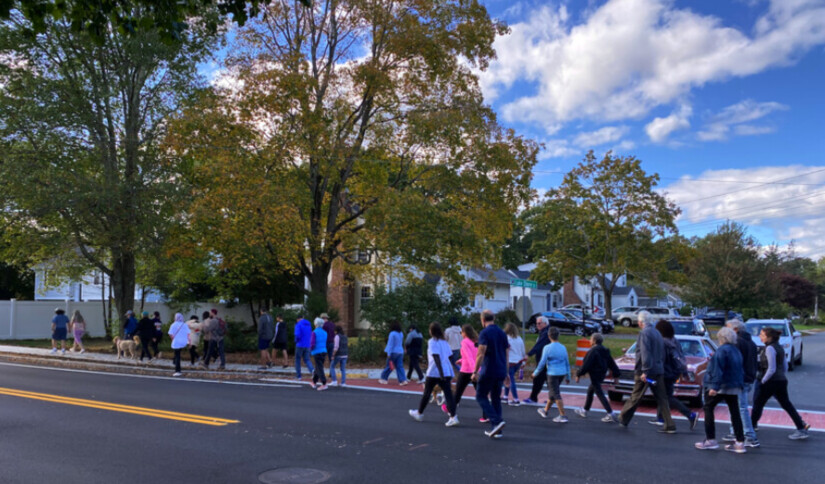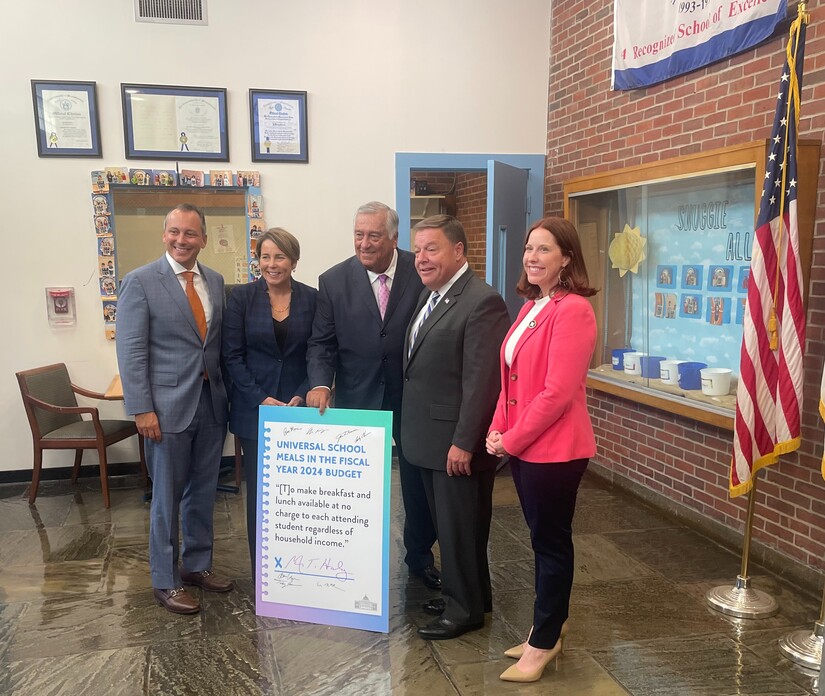Image


In the Town of Westwood, the percentage of people participating in the federal Supplemental Nutrition Assistance Program (SNAP), which helps low-income individuals and families purchase food, has increased by 18.2 percent, and Westwood households on SNAP have increased 13.8 percent, according to data that the advocacy organization, Project Bread, has provided to Westwood Minute.
Last week, Project Bread compared data from the Massachusetts Department of Transitional Assistance (Mass DTA) from March 2022 and March 2023, and found that:
Elizabeth Agbedun, Project Bread Advocacy Manager, explained the increase. She blames the lack of a realistic living wage, families made more vulnerable by the pandemic, and inflation.
“In the state, a lot of families would have to sacrifice housing, Medicare costs, [and] childcare costs in order to barely get by and get access to food. That’s not different for Westwood,” she says. According to Mass DTA, the number of Westwood households that have income levels at or below 200 percent of the poverty level is 6.3 percent of households, she says. “That’s 1,011 households in Westwood that find it hard to feed their families.”
On Sunday afternoon, October 22, 2023, community members in Westwood and beyond are participating in the annual Interfaith Mini Walk for Hunger. Participants seek to fundraise for Project Bread while shining a light on the invisible issue of hunger and food insecurity in the local community.
 Photo by Darlene Wong Cancell. A group of participants in the 2021 Interfaith Mini Walk for Hunger, a fundraiser to alleviate hunger in Massachusetts, begin their 3 mile walk on Westwood's Pond Street.
Photo by Darlene Wong Cancell. A group of participants in the 2021 Interfaith Mini Walk for Hunger, a fundraiser to alleviate hunger in Massachusetts, begin their 3 mile walk on Westwood's Pond Street. “I want to stress the fact that the Mini Walk for Hunger is a moment of visibility for that 6.3 percent of Westwood households,” says Ms. Agbedun. She speaks as someone who has experienced hunger and food insecurity, personally.
Ms. Agbedun remembers growing up food insecure. Her father, a single parent of three children, worked hard as a tutor at a local community college and as a caregiver in a direct care environment, while going to school. Even though he was a citizen, he had a degree, and was working, he faced racial barriers along with other challenges that “piled up” which made it hard to provide, she says.
“He worked really hard. We never saw my dad,” she said. “I never qualified for a free lunch.” Ms. Agbedun explains that her father made too much money for her family to receive fully subsidized meals. Yet, at the same time, he didn’t make enough to provide food security. “My dad didn’t have that money. It was always going to something else – house, rent,” she said.
“I used to be so embarrassed walking in the lunch line. . . . As a kid, I felt how nerve racking and embarrassing it was, and even shame for feeling hungry. You can’t escape it, just walking down the line. I always had a rough number in my head after I eat, [thinking] ‘This is how much I [ ] owe.’”
In Massachusetts, that embarrassment and stigma that Ms. Agbedun felt as a young person experiencing food insecurity may be abated by recent legislation. On August 9, 2023, Governor Maura Healey signed a 2023 budget that provides free school meals for public school students throughout Massachusetts, on an ongoing basis. Project Bread notes the legislation is a victory, calling it a permanent School Meals for All benefit.
 Photo courtesy of Project Bread. In Quincy, (R to L) Project Bread President and CEO Erin McAleer joins Quincy Mayor Thomas Koch, Speaker Ron Mariano, Governor Maura Healey and Chairman Aaron Michlewitz at the ceremonial signing of the Massachusetts Universal School Meals bill.
Photo courtesy of Project Bread. In Quincy, (R to L) Project Bread President and CEO Erin McAleer joins Quincy Mayor Thomas Koch, Speaker Ron Mariano, Governor Maura Healey and Chairman Aaron Michlewitz at the ceremonial signing of the Massachusetts Universal School Meals bill.When school meals are free to all, low-income students who might forgo a free lunch in order to avoid stigma, or who feel embarrassed for being singled out for taking a free meal, are now just one in the crowd of their peers. For example, during the pandemic and including the last school year, Massachusetts implemented free school meals on a statewide, temporary basis. While 6.3 percent of Westwood households are at 200 percent poverty level, 45 percent of Westwood students participated in the free school lunch program last year. It could be reasonable to expect that around the same percentage will again participate this year, too.
Reacting to the legislative win, Ms. Agbedun says, “Honestly, it feels amazing. . . . It was always a big question of, ‘Will it pass, or will it be the same old story?’ Massachusetts became the eighth state in the nation to pass permanent School Meals for All. Families began this school year with relief that their kids would be fed.”
Ms. Agbedun says the credit for anti-hunger advocates’ legislative victory is shared by past walkers in the Interfaith Mini Walk for Hunger. Last year, Interfaith walkers raised $24,000 for Project Bread which was directed to the school meals campaign, she says. “This is a major win for everyone in Massachusetts, including Westwood,” she adds.
But there is more work to do. Project Bread’s anti-hunger advocacy will continue with advocacy for program implementation, providing resources for families, and improving the quality of school meals, she says. “Right now, we are celebrating, but at the same time, we know there is more to do.”
For example, with a goal of improving the quality of school meals, Project Bread is investing in its Food Fellowship Program. The program introduces foods that reflect culture and ethnicity, and which are sensitive to dietary restrictions. The program aims to provide foods that are more accessible and enjoyable for students. All the menus heavily involve the kids, who taste the foods and have a say in approving or rejecting the menu item, notes Ms. Agbedun.
For community members who want to help Project Bread with its continued advocacy that includes help for the food insecure, registration is still open for participating in the Interfaith Mini Walk for Hunger. Funds raised will be donated to the organization.
“Hunger exists in Westwood,” says Ms. Agbedun. The annual walk is a “good way to focus on those who suffer in silence,” she says, “even in a community where everyone feels hunger doesn’t exist.”
If you or someone you know is experiencing food insecurity, speak to a counselor at Project Bread’s free and confidential food assistance hotline: 800-645-8333. Learn how Project Bread can help by visiting projectbread.org. Additionally, for Westwood residents, short-term grant assistance for food purchases, utility bills and more is available for those experiencing a financial crisis. Apply to Westwood Community Chest for confidential consideration of your grant assistance request.
Thanks to Elizabeth Agbedun and Project Bread for speaking with Westwood Minute.